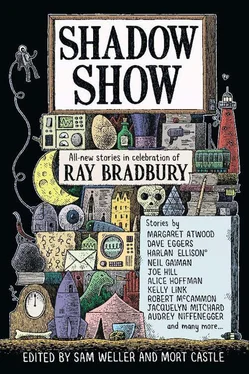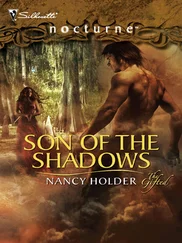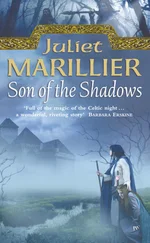One evening, when Doug was nineteen and home for Christmas break, he walked upstairs to ask his uncle what he wanted for dinner. When he opened his uncle’s bedroom door—his mother’s bedroom door—he saw his uncle lying perfectly motionless on the bed, on his back, a white sheet pulled up to his neck, his skin already as gray as a midwestern sky in late November. Doug’s first impulse was to call 911, but at the phone he paused. It’s too late, he thought. There’s nothing to be done. He sat on the side of the bed and spent time with the dead man before making the call.
It’s cold out tonight, and Doug can’t stop shivering. It’s as though the convulsions are now part of his nervous system, utterly beyond his control, so he tightens his grip on the phone bill so as not to lose it when he trembles.
He rounds a corner, where the tall, slim Belvedere stands like a soldier among kneeling prisoners. He starts picking up his pace to reach the revolving door when he realizes that the building’s plaza, with its manicured trees and freshly painted garbage cans, is crowded with dozens of people. He recognizes Mary Beemis, whose daughter disappeared one winter afternoon after school, never to be seen again. He sees across the way Mr. Simon, whose Alzheimer’s-riddled father wandered away one night in the freezing cold—gone forever. In front of him stand the Garcia twins, now in their twenties, whose parents were killed in an unsolved hit-and-run. These are the city’s grievers, its mourners, and they are all peering up at the Belvedere and whispering, as though praying to a temple of their own lost souls.
The phone bill slips from Doug’s fingers, kisses the concrete, and then skitters down the paper-strewn street. He had thought he’d come here looking for answers, but he sees now that there are no answers. He is here for the same reason so many others are here—to let the past go, to move on. Out of breath, still trembling, Doug slowly crosses the street, where in the cold predawn he joins ranks with his tribe of the bereaved, more than a hundred others standing together, shoulder to shoulder, but utterly and forever alone.
About “The Phone Call”
In 1989, one year after my mother died of cancer, I woke up in the middle of the night, walked to my typewriter, and hammered out a short story in one sitting. I even gave it a title: “The Phone Call.” It was the story of a son, who, through mysterious means, tries to save his mother’s life, even though she is already dead. Writing the story was a necessary exercise in catharsis, an apology to my own mother for not having done more to save her from dying—not that there was anything I realistically could have done. I printed up a copy of the story to work on later, but then an odd thing happened. I lost it. For years afterward, I considered rewriting the story from memory. I occasionally jotted down notes. When I began writing screenplays, I outlined a movie version of the story. About ten years ago I found the story again. The paper had yellowed, and the ink from the dot-matrix printer had faded, but there it was—the lost story! I read the first page before deciding not to read any more of it. I didn’t want to be influenced by the original version should I ever decide to rework it, so I set it aside. I haven’t seen it since. I recently tried finding it but didn’t have any luck. Once again, the original version is lost.
When I was contacted about contributing a story to this anthology, I knew right away that I was (finally!) going to write “The Phone Call,” and when I sat down to work on it, the pages came quickly. The story, after all, had been gestating for more than twenty years. That’s not to say that the story didn’t surprise me or take me in new directions. It did. And I’m grateful for that. But the original story’s DNA is fundamentally intact in this version.
Like many writers, I was inspired to become a fiction writer because of Ray Bradbury. I read The Illustrated Man in grade school, highlighting the titles of stories that I liked best. The power of those stories, the originality, their distinctive voices—all of these things lingered with me for decades. If the Russian Realists came out from under Gogol’s overcoat, then contemporary speculative writers have followed Ray Bradbury off his flying saucer. But speculation in a Bradbury story is always subterfuge for something much larger and deeper, and there’s a damn good reason why his work has endured: His stories are, first and foremost, about people in crisis—people we care about… people Ray cares about. “The Phone Call” owes a debt to this great writer, who taught me that the core of any good story, whatever its fantastical premise, is always the liabilities of the human heart.
—John McNally
But the outpost colony of that otherwise uninhabited planet was known to be Christian, said to have been settled by members of two devout families. Both of these families had—like other believers before them—crossed inconceivable distances, rebuked the trappings of a civilization gone without God, and marshaled all they could against the ignominy of doubt to begin again, to build the world anew. This was the explanation most often given for the colonists’ insistence on isolation and their curious fortitude: It was thought that no one but a religious settlement would have been able to make anything out of a land so bleak. The unnamed planet on which the colony had been built was inconsiderable, closer in size to Phobos, the Martian moon, its one hemisphere covered in a perpetual half-gray darkness. Other than the silver boundaries of the colony itself, which consisted of three glass domes—used for shelter and various farming developments, surrounded by oddments of tunnels, barracks, and air locks—there was nothing: only the arid patchwork of hundreds of low hills covered in red dust and then, above those, the unappealing immaculacy of outer space.
There it is, up ahead,” Quinn said, pointing to a red rise in the distance. The boy nodded to himself, having almost given up hope a few paces back. But there it was now: the low, pyramidal hill, and beside it the path he had made a week earlier.
With his left hand he took hold of the girl Lana’s heavy silver glove, his breath—coming faster as they climbed along the incline—fogging up the inside of his convex helmet. Lana slipped a little in the dirt, and Quinn had to hold on to her with both hands. Once they stumbled to the peak, they both rested, Quinn leaning over, his breath appearing and then disappearing along the seamless inside of the helmet, Lana sitting down in the dust, holding her heavy helmet up with both hands.
“If I had known it was going to be so far… ,” she said, but did not bother to finish her sentence.
Beneath the rounded helmet, Quinn could see that the girl’s cheeks were flushed. It looked more than lovely. There was an odd strand of blond hair plastered along her forehead, which was dappled by a few nearly indistinguishable dots of sweat. She looked like a child sitting there, pouting a little, her eyes closed as she tried to catch her breath. She was fourteen, one year older than Quinn. Both of them had been born somewhere on the voyage from There to Here, a single point on a starry map no one could trace or be sure of anymore, as everything that was the Past, including the ship used for their passage, had been disposed of, dismantled, or buried a long time ago. There was a joke Quinn’s mother used to tell him when he was younger, as she tucked him into bed, something about being born in space, “her child, created out of the dust of stars,” which he never understood and which he could no longer quite remember. He looked down at Lana, watched her cheeks cool to a softer white, and then asked, “Are you ready?”
Читать дальше



![Lord Weller - Ритера или опасная любовь [СИ]](/books/421202/lord-weller-ritera-ili-opasnaya-lyubov-si-thumb.webp)








